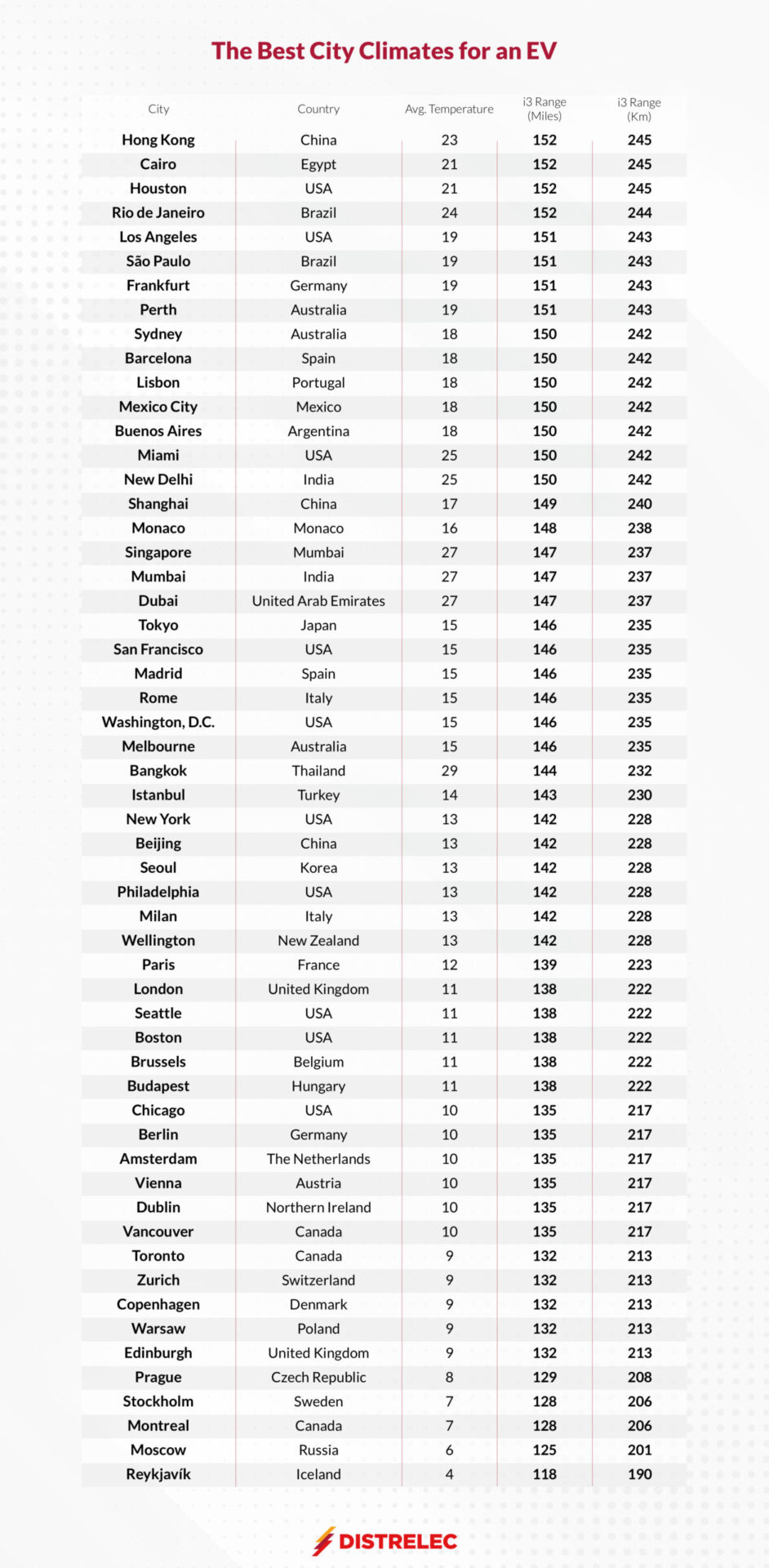It’s no secret that Electric Vehicles have risen in popularity in recent years. With many consumers becoming more aware of the impact petrol and diesel cars have on the world we live in, car manufacturers across the globe have taken it upon themselves to find an alternate, eco-friendly solution.
As climate consciousness grows and the movement continues to gain momentum, we began to wonder…what are the best weather conditions for these designs to not only drive in but also thrive in?
According to recent studies, an EV battery performs optimally at temperatures between 20°C and 25°C. Using GeoTab’s EV temperature tool, we were able to analyse which cities across the world maintain the best climate to make the most of your mileage.
To collect the data, we compared the average yearly temperature across 56 major cities around the world, utilising GeoTab’s tool to uncover which temperature was optimal for the BMW i3.
The Best City Climates for an EV
Our data revealed that the ideal climate is 21°C for an EV to get the highest number of miles out of a single charge; meaning that Hong Kong, Cairo, Houston and Rio de Janeiro all maintain the perfect average temperature to achieve a peak mileage of 152 miles. At the top of the scale, Rio’s average temperature is 24°C – anything higher than this, and you’ll soon see your mile count depleting more rapidly.
At the other end of the spectrum, cold weather can also have adverse effects on your EV. Countries such as Canada, Poland, Russia, Iceland and some areas across the UK will need to take extra care of their electrical vehicles during the winter months. Reykjavík’s average yearly temperature is just 4°C, losing residents an average of 34 miles from a full charge in comparison to those within the optimal temperature bracket.
However, all is not lost; if you reside in a country with less-than-favourable weather conditions for your EV, there are plenty of tips and tricks to keep your vehicle running smoothly all year round.
Getting The Most out of your EV During the Winter
During colder months, there’s a chance that vehicles that contain internal combustion engines (ICE) won’t start up immediately due to the gasoline dropping in temperature, and therefore evaporating slowly. However, this isn’t the case when it comes to EV’s – these vehicles are designed to start up regardless, even if the surrounding temperatures drop significantly. Nonetheless, whilst the cold may not affect the car starting in the first place, it can affect how long the car will run due to the impact the detrimental conditions will have on the batteries used to store the electricity.
Shielding your EV from the elements during harsh weather will also have a positive impact on battery health, so if you have a garage or covered area you’re able to store your car whilst it’s not in use, do it!
In addition to this, electric vehicles are known to be heavier, with the average reportedly sitting at 1,940kg resulting in a potentially higher risk during icy conditions. This means that they’re substantially more weight-bearing on the ice than petrol or diesel alternatives, so it’s important to ensure you’re driving slowly and safely in inimical conditions.
Getting The Most out of your EV During the Summer
Now, ice and snow aren’t the only circumstances you need to look out for when it comes to your EV’s battery life and expected mileage per charge. Heat can also have a negative impact on the length of time your vehicle stays up and running, as the lithium-ion batteries used to power EVs are shown to perform worse and deplete rapidly in warmer climates.
Whilst the weather is warmer than usual, it might be tempting to reach for the air conditioning; however, using your air-con during a drive is said to be enough to reduce your range by up to 17% – so, getting the most out of your charge is your priority, this may not be the best option.
Interesting in making the move to EVs? Check out our Electric Cars for sale here. Use our click & collect service to discover the five simple steps to purchase your new or approved used vehicle online today.
Methodology
Distrelec curated a list of all major global cities. We then found the average highest temperatures and average lowest temperatures recorded and found the average temperature overall. Using GeoTab EV Temperature Tool, we then put in each temperature using the BMW i3 as an example EV, to see which cities have the best average temperature to suit electric vehicles.











